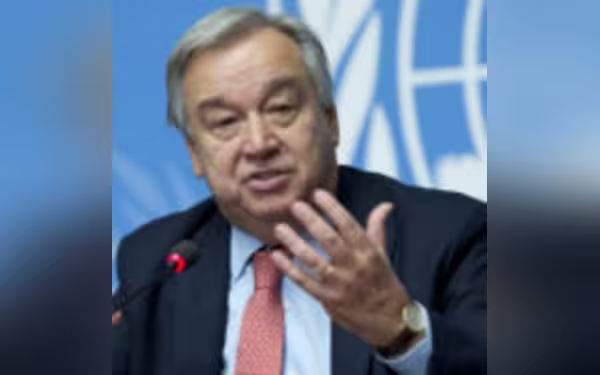Saturday, November 16, 2024 08:46 PM
104 Nations Condemn Israel's Persona Non Grata Declaration Against UN Chief
- 104 nations condemn Israel's declaration against Guterres.
- Israel's action undermines UN's authority and mission.
- Call for peace and cooperation in the Middle East.
 Image Credits: pakistantoday
Image Credits: pakistantoday104 UN member states condemn Israel's declaration of Guterres as persona non grata, emphasizing the need for peace and cooperation in the Middle East.
In a significant diplomatic move, a coalition of 104 United Nations (UN) member states, along with the African Union, has publicly condemned Israel's recent declaration of Secretary-General Antonio Guterres as "persona non grata." This declaration, made by Israel's Foreign Minister Yisrael Katz, has sparked widespread criticism, as it is seen as an affront to the UN's authority and mission.
The term "persona non grata" is a diplomatic term that means a person is unwelcome in a particular country. In this case, Israel's decision to label Guterres as such came after he called for an immediate de-escalation of tensions in the Middle East. The situation has been tense, with ongoing conflicts and violence affecting the region. Guterres has been a vocal advocate for peace, urging all parties involved to seek a resolution that respects international law and humanitarian principles.
The statement issued by the 104 nations emphasized that labeling Guterres as "unwelcome" undermines the UN's mandate. It highlighted the importance of the UN's role in promoting peace and security, particularly in the Middle East, where the quest for a two-state solution—allowing both Palestine and Israel to coexist peacefully—is ongoing. The nations reaffirmed their full support for Guterres, expressing confidence in his commitment to international law and humanitarian efforts.
Furthermore, the coalition urged all parties to respect the UN's leadership and to avoid actions that could weaken its critical role in conflict resolution. They called for initiatives that would contribute to a peaceful and lasting solution to the crisis in the Middle East, emphasizing the need for cooperation rather than confrontation.
Israel's decision to declare Guterres "persona non grata" followed accusations that he failed to explicitly condemn Iran for its alleged involvement in recent rocket attacks. While Guterres condemned the escalation of violence and called for a cease-fire, he did not directly address Iran's role, which led to Israel's strong reaction.
This situation raises important questions about the future of international diplomacy and the role of the UN in conflict resolution. As tensions continue to rise in the Middle East, the need for dialogue and cooperation becomes even more critical. The international community must work together to support initiatives that foster peace and understanding, rather than allowing political disagreements to hinder progress. The hope remains that through collective efforts, a peaceful resolution can be achieved, allowing both Palestine and Israel to thrive side by side in security and harmony.













